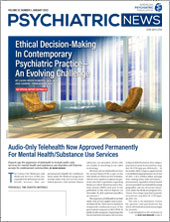They are transported to the emergency department in handcuffs, often injured, sometimes pepper sprayed. In the midst of a psychiatric emergency, these individuals or their loved ones called 911 for help, and the police responded.
This is not at all the encounter these individuals, already under tremendous stress, were expecting when they reached out for help, Elizabeth S. ZoBell, M.D., a resident psychiatrist providing acute care at the VA San Diego and the University of California San Diego Medical Center in Hillcrest, told Psychiatric News. “Most patients are confused and may spend up to 72 hours or more lying in the busy emergency department hallway. As you can imagine, this is not a therapeutic experience. Rather, it is often traumatizing and fractures patients’ relationship with the mental health care system.
“By the time a mental health care clinician sees them, they don’t want help anymore; they’re asking instead to be discharged,” ZoBell said. The resulting frustration is also a major source of burnout for emergency department staff and acute care psychiatrists, she added.
In 2020, the Federal Communications Commission designated 988 as the new, easy-to-remember, three-digit dialing code to be used for all mental health, suicidal, or other psychiatric crises. FCC ordered all telecommunications companies to make the necessary changes so that all calls to 988 are routed to the National Suicide Prevention Lifeline starting July 16. The goal is for the hotline to offer specialized services to veterans, LGBTQ individuals, and individuals in other high-risk groups.
“This change offers a unique opportunity for psychiatrists to lead a transformation of how behavioral health crises are handled,” Eric Rafla-Yuan, M.D., APA’s Jeanne Spurlock Congressional Fellow, told Psychiatric News.
Transforming Crisis Services
Congress passed a law last October allowing states to assess a fee on cellphone users to cover the costs for providing services to people in crisis. The National Association of State Mental Health Program Directors issued model 988 legislation to serve as a blueprint for states. Rafla-Yuan said beyond developing the call center infrastructure, these state laws can transform crisis service delivery by creating on-the-ground mental health crisis teams who can approach and engage people in a trauma-informed way by focusing on assessment, triage, and connection to support. These state laws can also create community-based crisis-stabilization clinics that can take the place of emergency departments in most cases by offering quiet, safe, and supportive environments staffed by mental health professionals. The clinics can offer individuals a place to stay for 12 to 72 hours, receive support, and be connected with mental health services in their community.
“If done well, this would radically change our patients’ experience with the mental health care system and increase the resiliency of our communities,” ZoBell said.
Only a handful of states and communities now offer these types of comprehensive crisis services. Without new laws and supporting infrastructure, police officers will continue to be the ones to respond to behavioral crisis calls, leading to traumatizing use of handcuffs, arrests, jail stays, and long waits in emergency departments for people in crisis, or worse. Rafla-Yuan believes that involving lethally armed agents in psychiatric emergencies criminalizes crisis encounters; deviates from the clinical standard of care; and increases the risk of violence, particularly against people of color.
States Enact New Crisis Services Laws
As part of the transition to 988, several states have recently enacted laws to completely overhaul the way they handle behavioral crises, including Colorado, Nevada, Virginia, and Washington. These new laws will allow them to build out their local call center infrastructure, manage increases in call volume that are expected when 988 goes live, and create new local crisis services to serve those in need. Perhaps most importantly, each of these states has included in its law an ongoing means of funding these new crisis services by tacking a small user fee onto each phone line, residential and commercial, as has been done for 911 for decades.
Virginia was the first state to pass a 988 user fee; there, consumers will pay 8 cents to 12 cents a month for each subscription or prepaid wireless line. Most consumers don’t notice the 911 fees, but they add up: nationwide, 911 fees generated $2.6 billion in 2018 to support emergency medical services. Funds raised from Virginia’s 988 tax will be funneled into its newly created Crisis Call Center Fund and be spent along the entire continuum of crisis care, from the crisis call center to community care and stabilization centers. One goal is to increase its in-state answer rate for behavioral crisis calls, which prior to these changes, was about 51% and also to fund a statewide data platform so that it can easily integrate services and dispatch mobile crisis providers, track answer rates, link to the statewide bed registry, and connect callers to community and private service partners.
In an effort to turn the tide on its rising suicide rate, Washington state is leading the way with its comprehensive 988 implementation law. It enacts a user fee on phone lines; expands the use of mobile rapid response crisis teams; creates 23-hour crisis-stabilization units based on the “living room” model that uses a calm, safe, and quiet environment; offers immediate care and support from peers and trained counselors; and establishes same-day/walk-in behavioral health services. The 46-page law also requires the use of certified peer counselors and aims to address the needs of populations at greatest risk of suicide, including people of color, LGBTQ youth, veterans, American Indians, and Alaska natives.
Illinois and Indiana passed infrastructure laws, but they did not include fees or appropriations to support that infrastructure. Oregon and Utah have passed 988 infrastructure laws and appropriated funds without adding a user fee. Eleven more states have introduced varying 988 laws as of press time.
What happens in states where no law is passed? States that do nothing to implement 988 will still have a new three-digit number for psychiatric emergencies, but they will see little other change.
“The number for crisis services will switch to 988 in July, but that’s the only thing that we can take for granted here,” Rafla-Yuan said. “Everything else that happens when someone calls that number is still up in the air in these states. This is why advocates are needed at the state and federal levels to obtain the resources and support to make sure the needed changes happen.”
What needs to happen in the coming months? “First of all, education and awareness are needed,” Rafla-Yuan said. “Most psychiatrists probably aren’t even aware that 988 is coming, so how can we expect the average folks on the street in need of services to know to call 988 instead of 911?”
Just as important is a change in mindset: “Crisis services are often an afterthought. Police have done it for so long that psychiatry has more or less abdicated it to them—not because it’s the best way to do things, but that’s just how the system evolved. Now, psychiatrists have an opportunity to be leaders in their community by advocating for change, both for their patients and the health of their community.”
Rafla-Yuan said public perception also needs to shift. “Often there’s this misperception that someone who is having a mental health emergency is a dangerous armed criminal and that police involvement is needed, but studies show that police backup is rarely needed.” (A 2019 study by the Eugene, Ore., Police Department Crime Analysis Unit on the city’s mobile behavioral health crisis teams found that police backup was requested in only about 2% of cases that year.) Deciding how to pay for new services is also a significant issue.
At press time, the Department of Health and Human Services announced it was investing $282 million for the 988 transition, representing a 10-fold funding increase, including $177 million to improve and expand existing Lifeline operations and $105 million for staffing states’ local call centers.
Improving crisis response services has bipartisan support. APA strongly supports the Behavioral Health Crisis Services Expansion Act (HR 5611/S 1902), which would establish standards for a crisis continuum of care, including crisis call centers, mobile crisis teams, crisis stabilization services, and short-term crisis residential and behavioral health urgent walk-in care. It would also require Medicare, Medicaid, employer-sponsored, and various health plans to provide insurance coverage for these services. Another bill, the Crisis Assistance Helping Out On The Streets (CAHOOTS) Act, would provide states with enhanced federal Medicaid funding to set up community-based mobile crisis services.
Rafla-Yuan sees an urgent need for psychiatrists to get involved in advocating for crisis services laws in their states through their APA district branch.
“There is an opportunity for us, just like in the 1970s when the emergency medical system [EMS] was created. When we design a dedicated crisis system that is able to take care of psychiatric emergencies just like 911 and EMS are able to take care of medical emergencies, this could be the defining moment that will change mental health care and psychiatry forever.” ■
Model legislation for 988 implementation by the National Association of State Mental Health Program Directors is posted
here.
Washington state’s legislation is posted
here.
The Eugene, Ore., report is posted
here.


